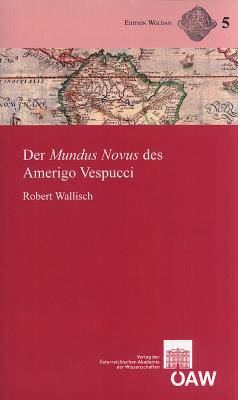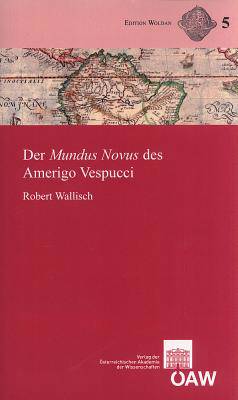
- Retrait gratuit dans votre magasin Club
- 7.000.000 titres dans notre catalogue
- Payer en toute sécurité
- Toujours un magasin près de chez vous
- Retrait gratuit dans votre magasin Club
- 7.000.0000 titres dans notre catalogue
- Payer en toute sécurité
- Toujours un magasin près de chez vous
Der Mundus Novus Des Amerigo Vespucci
Text, Ubersetzung Und Kommentar
Robert Wallisch
Livre broché | Allemand
50,95 €
+ 101 points
Description
Amerigo Vespucci, der florentinische Bankier, der sich fur die Expeditionen, die er zunachst nur finanzierte, so sehr begeisterte, dass er in seiner zweiten Lebenshalfte Kosmographie und Astronomie studierte, leistete gerade in seiner Rolle als Aussenseiter und Amateur einen wesentlichen Beitrag in der Geschichte der fruhen Entdeckungen, denn er war einer der ersten wissenschaftlich interessierten Europaer, die ihre sichere Studierstube verliessen, um unter Gefahr fur Leib und Leben neue Wirklichkeiten vor Ort zu erforschen und zu beschreiben. Amerigos breitgefacherter kultureller Hintergrund, seine Position zwischen der Zivilisation des Florentiner Humanismus und den Erfahrungshorizonten iberischer Seefahrer haben ihn dazu pradestiniert, die authentische Stimme einer neuen Zeit und einer "Neuen Welt" zu werden, in der man nicht nur weiter reisen konnte und in grosseren Zusammenhangen denken musste, sondern auch Geschichten zu erzahlen hatte, wie sie noch nie zuvor erzahlt worden waren. Vespuccis 1502 erstmals erschienener "Mundus Novus" markiert daher einen Wendepunkt der europaischen Geistesgeschichte. Der kurze lateinische Text transportiert nicht nur die Idee einer Neuen Welt, sondern formuliert auch die Ablose der antik-humanistischen Buchwissenschaft durch die Empirie der Entdeckungen. Daruber hinaus stellt Vespuccis Schrift den Prototyp des neuzeitlichen Reise- und Abenteuerromans dar. Die vorliegende Arbeit bietet neben Text und Ubersetzung auch einen ausfuhrlichen Kommentar sowie Tafeln zur Bio-Bibliographie Vespuccis und den relevanten Reisedaten. Zwei Essays beleuchten die kulturgeschichtliche Bedeutung von Text und Autor und weisen anhand neuer sprachlicher Untersuchungen die bislang umstrittene Authentizitat des Textes nach....Amerigo Vespucci, the Florentine banker who was so filled with enthusiasm for the expeditions he financed that in the second half of his life he started studying cosmography and astronomy, played an important role as outsider and amateur in the history of early discoveries. He was one of the first scientifically interested Europeans to leave the safety of their studies to investigate and describe new and exotic realities at risk of life and limb. Thanks to his rich intellectual background and his position between the culture of Florentine humanism and the experiences of Iberian seafarers he was to become the authentic voice of a new age and a "New World".Amerigo Vespucci's "Mundus Novus", first published in 1502, thus marks a turning-point in the history of Europe. This short Latin text not only communicated the idea of a "New World" but also put an end to the authority of ancient humanistic book-knowledge by launching the empirical method of discoveries. In addition Vespucci's text represents the archetype of modern adventure and travel stories. The present edition comprises the Latin text, a German translation and a detailed commentary. Two essays throw new light on the cultural importance of both text and author. New linguistic investigations definitively confirm the hitherto contested authenticity of the text.
Spécifications
Parties prenantes
- Auteur(s) :
- Editeur:
Contenu
- Nombre de pages :
- 196
- Langue:
- Allemand
Caractéristiques
- EAN:
- 9783700130697
- Date de parution :
- 31-12-12
- Format:
- Livre broché
- Format numérique:
- Trade paperback (VS)
- Dimensions :
- 130 mm x 208 mm
- Poids :
- 249 g

Les avis
Nous publions uniquement les avis qui respectent les conditions requises. Consultez nos conditions pour les avis.






